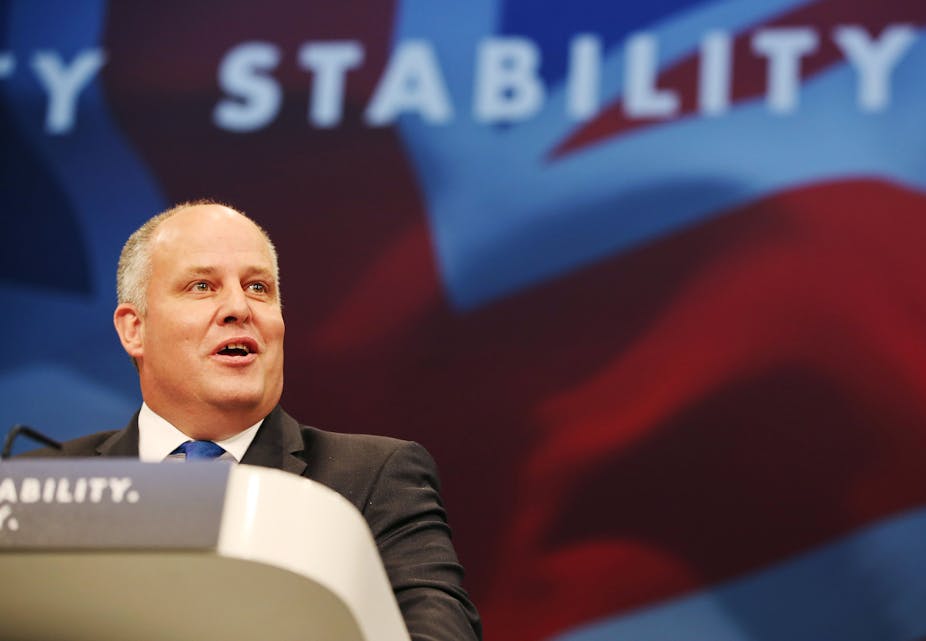So, farewell then, Andrew RT Davies, leader of the Conservative group in the Welsh Assembly and self-declared “19 stone of prime Welsh beef”. His resignation leaves plenty of room to speculate on those favourite questions of journalists, commentators and political historians: why, what next – and who next?
There’s no definitive answer to “why”. Davies certainly didn’t let on in his resignation letter, but it appears that internal party tensions have been bubbling under the surface for some time. He is an ardent Brexiteer in an Assembly group dominated by remainers. And he was recently criticised strongly by the minister for defence procurement, Guto Bebb, for dismissing news that Airbus might move jobs out of north Wales.
He also has a poor relationship with Welsh secretary Alun Cairns – and some voters find his heart-on-the-sleeve, direct, and upfront brand of politics grating.
It might become clear in the next days and weeks who conspired to do what, and what precisely was said in the fractious group meeting before “RT” resigned. But, for now, the public is not in the know.
Straight talker
Davies’ legacy will be mixed. Unfortunately, most people who know of him probably do so because of an unfortunate gaffe (which he laughed off well) at the 2016 Conservative Party conference, when he told the audience that “breakfast”, not Brexit, would be “a success”.
The almost embarrassingly low profile of the Conservatives in Wales means that Davies is not a UK household name (even in households that are interested in politics) in nearly the same way that Ruth Davidson, the Scottish Tory leader is. This tells us something about how Wales is often sidelined in the national political narrative – which is a shame – but it is also a natural consequence of the generally uninspiring nature of politics in Cardiff Bay.
Nevertheless, Davies should rightly go down in history as a rare example of that kind of politician most of us claim to want to see more of: someone who speaks clearly and firmly and sticks to their core beliefs. His decision to campaign to leave the EU might not have gone down well in liberal Cardiff circles, but it did show that he was independently minded, telling it as he saw it. There would have been significant pressure on him from London not to take that stance.
We also tend to forget, two years on, that almost everyone thought the leave camp was going to lose – so it was not as if Davies was making a self-promoting or careerist move. He also proved, in the end, to have judged the mood, not just of the overall general public, but of the Welsh voters – and this deserves to be emphasised.
Once we realise this, we begin to see that perhaps Davies’s brand of forthright and straight-talking Conservatism might not have been as unpopular as liberal commentators often assume. Most think that the pragmatic, consensual and “moderate” approach of Nick (now Lord) Bourne worked wonders for the fortunes of Welsh Tories.
But that is normally the judgement of people who don’t like the Conservative Party and who want it to be more centrist or left-leaning. Those who actually vote for the Conservatives – and the party’s dwindling grassroots membership – seem to rather like Davies, in the same way that they liked the first leader of the Assembly group in 1999, the rumbustious and fiery Rod Richards.
Take a look at Davies’ Conservative Home poll ratings – they are favourable. As are the comments underneath the website’s article announcing his departure.
Wales has always had a significant following for politics right of the centre, despite being labelled a Labour heartland. The majority voting to leave the EU, and the decent showing for UKIP in the last Welsh Assembly elections are just two recent pieces of evidence for this.
This is why if the next leader is to be, as is expected, Paul Davies – the gentle and pleasant AM for Preseli Pembrokeshire – then the party might be making a rod for its own back. The dwindling grassroots membership, and many who vote Tory (and those who voted UKIP last time but may well not in 2021), probably don’t want another centrist or someone signed up to the nationalist-lite Cardiff Bay agenda. They would argue -– understandably -– that there are plenty of politicians and parties who offer that already.
But -– and this is the dilemma –- it is only by adopting this kind of politics that any possibility of a an alternative coalition government in Wales can materialise. The current make up of parties – and the fact that Labour has dominated the Senedd since its very inception – means that a Tory coalition with Welsh nationalist party Plaid Cymru is currently the only way that a different government could succeed.
One can’t help but feel, however, that the Conservative membership would rather be a robustly right-of-centre opposition party than in government with Plaid Cymru types who happily admit to being socialists.
When you think about it that way – and realise there aren’t many viable alternatives to replace “Andrew RT” – it wouldn’t be too outlandish to bet on him making a return.

